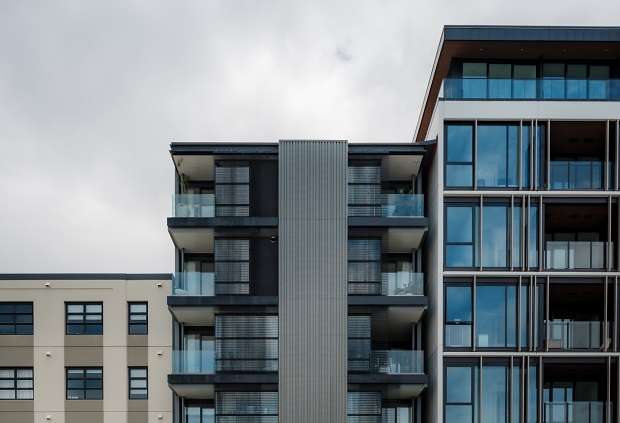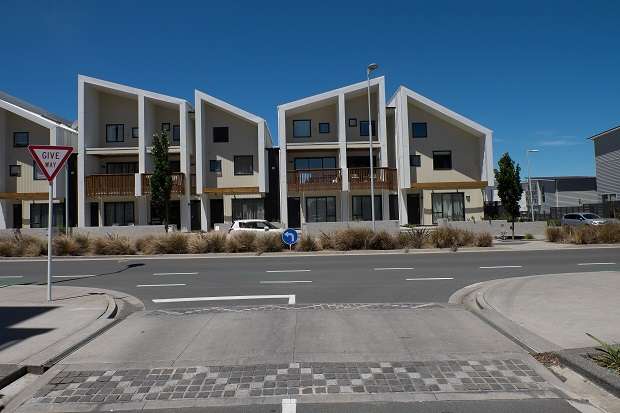Apartment living is an option that more and more buyers are leaning towards.
But it can cost a lot if you want exactly the same features as a house – but in an apartment- with no compromises.
Luxury real estate agent Michael Boulgaris, who recently sold a 175sq m apartment in Orakei for $6m, says the apartment market has proven to be the most popular this year.
He sees the New Zealand apartment market has finally reached international standards, changing Kiwi’s perception of what makes an ideal home.
Start your property search
“In Paris, London and New York they are accustomed to apartments and they build up, rather than out, because the land is so expensive.
“Kiwis always wanted their quarter acre flat section. Finally, it’s taken us good 20 years to realise apartments are just as great to live in,” Boulgaris says.

New well-designed apartment buildings have the finishes and space of a stand-alone house, with added benefits of shared amenities and lock up and leave. Photo / Ted Baghurst
So, how do you choose an apartment that is better than a stand-alone house?
No matter what price bracket you are buying in, experts all agree you will pay for views. And the higher you want to go for those bigger views, the more you need to pay.
However, if you have a pet or kids, a garden apartment is handier and more secure, Boulgaris says.
He adds that if you are into gardening, the ground floor apartment or one with a green yard will be the best option. Otherwise, cut your greenery down to a few herbs and pots which can grow on the apartment balcony.
Boulgaris says there are three types of buyers for apartments – retirees, professional couples and investors.
These three types of buyers have different priorities and budgets and will pick an apartment that’s better than a single family house based on the factors important to them.
“At an entry level it’s all about affordability, but at a luxury level it’s all about needs and requirements,” he says.
NZ Sotheby’s International Realty agent Pene Milne, who is marketing several luxury apartment properties in Auckland, says apartment buyers chose the perfect apartment depending on their lifestyle and budget.
Apartments that have the same features as houses can cost $2m and more.
“It depends on where you’re at in life, what works for you, how old your kids are and what you are trying to achieve,” Milne says.
Apartments normally lack extra parking spaces so extra garaging that's on par with a house garage will add to the price.
Unlike houses, a lot of apartments don’t have a transition zone or a hallway between bedrooms and living spaces. If you want more space and zone separation, add more to your budget too.
An apartment that’s ideal for a first home buyer working in the city is different from the apartment boomers are downsizing to.
“If the person’s budget is for a one-bedroom apartment and it gets them on the ladder then it might be a compromise to a house. But it’s all about what you can afford at a time and how it fits it.
“If they are young professionals, that’s fantastic, it’s exciting times for them,” Milne says.
She says the variety of apartments available on the Auckland market is wide, which means buyers aren’t limited to an apartment that compromises what they want in a home.
“I think that what we have now is array of apartments that definitely offer people what they perceive to be wonderful advantages over living in a house. People get what they need, in one level and without all that extra maintenance.”

Three-level walk up apartments in new areas like Hobsonville Point fit into the look of the community's streets. Photo / supplied
Hayley Fitchett, who heads master planning and placemaking for government housing organisation Kainga Ora, says that the new apartments for affordable and social housing are designed to be much better than the old houses they replace.
In the next 10 years the organisation will be building 25,000 new affordable homes, replacing 5000 state houses with 11,000 public housing homes, and the rest for private buyers, including KiwiBuild. Some of these new homes will be in up to three level walk up apartments, while others will be in townhouses.
“To my mind there is not actually a trade-off between an apartment and a [standalone] house,” she says.
“All of the things you might want for a house are there, just in different ways. Somewhere for your dog to run, or your cat to be safe, a vege garden or somewhere for the kids to kick a ball around, we make sure people can do all of those activities.
“Some of them might be in communal areas that we design to be multi-functional. It might look like a beautiful landscape, but to kids it’s a natural playground. Or public art might make the building beautiful, but again, kids can play. The rooftop terrace might host a party, or a book club meeting.”
Fitchett says that amenities like swimming pools would never be affordable for a detached home, but when they are shared, the costs are negligible to apartment dwellers – and owners don’t have to worry about maintenance, the body corporate takes care of that.
“Apartments can remove a whole level of worries about maintenance, or locking and leaving.”
Careful architecture and master planning also means that while that apartment maybe 50 or 70 sq m, there is no space wasted. More new builds, she says, incorporate a shared guest suite for all the residents that can be used for the two or three times a year they might have overnight visitors – much cheaper than paying for a spare room that is barely used.
“You only pay for things you need, when you need them. We estimate that an extra bedroom to a home can add between $100,000 and $200,000 to a house price. “
- This content was created in partnership with Kāinga Ora








